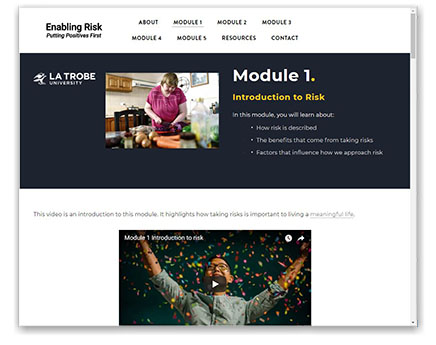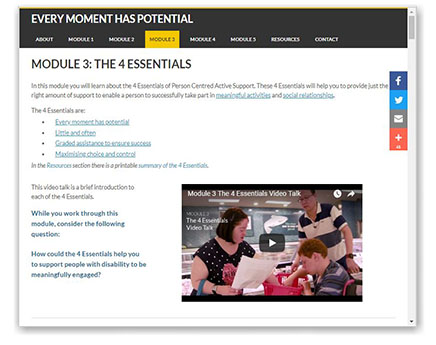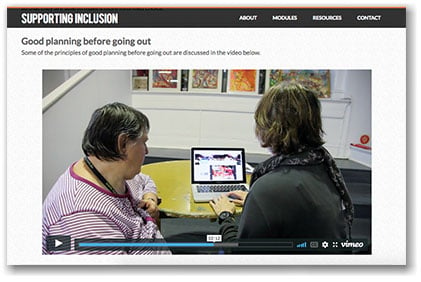Resources and Publications
As part of our goal to effectively disseminate and translate research, we have collated (in one place) all relevant LIDS-produced resources for people with a disability, their families, carers and associated services.
Quality Hospital Care for People with Intellectual Disabilities
This set of resources includes videos filmed with actors to depict good practices across the hospital system. It has been designed for staff in health and disability services, family members and people with intellectual disabilities. They are based on a Framework for Quality Hospital Care developed from the Living With Disability Research Centre’s earlier research.
There are four elements:
- Knowing about systems,
- Informing those who need information about the person,
- Supporting the person through the journey, and
- Collaborating with others involved in the persons health and social care.
https://www.hospitalinclusion.au/
Designing reasonable adjustments to support school inclusion for children with a disability
This e-learning resource was developed to help individuals design and apply reasonable adjustments to support mainstream school inclusion of children with a disability. It can be used by parents, educators, education support staff and allied health professionals. Upon completing the modules in this resource, we expect that you will gain a better understanding of, and confidence in, designing and implementing reasonable adjustments that facilitate inclusion. The best supports for students are often those that come from shared expertise and experience in supporting students to access the curriculum and to develop strong social ties with other students. By learning more about reasonable adjustments, this resource will help ensure equal access to school education for students, regardless of the type or extent of their disabilities
https://www.reasonableadjustmentsinschools.org.au
Frontline Practice Leadership Training Resource
https://www.practiceleadershipresource.com.au/
This online training resource is for frontline supervisors, service managers, and experienced support workers. Each day, support workers directly influence the quality of life of the people they support. What support workers do and how they do it matters to the lives of people with intellectual disabilities. Support workers - like staff in any organisation - need guidance, instruction, and support to develop their skills and become competent. It is the role of Frontline Practice Leaders to help support workers to develop and enhance those skills. The Frontline Practice Leadership training resource can be used for in house training, individual study or in team discussions.
The Frontline Practice Leadership trining resource was developed from research by the Living with Disability Research Centre at La Trobe University, funded by the National Disability Insurance Scheme Quality and Safeguarding Commission, and filmed with the support of Unisson Disability Services.
The La Trobe Support for Decision Making Practice Framework
http://www.supportfordecisionmakingresource.com.au
This online learning resource is about support for decision making. It will present the first evidence-based framework to guide you through the process of supporting people with cognitive disabilities to make decisions. Using this framework will help you to enable the people you support to exercise choice and control in their own lives.
 Enabling Risk: Putting Positives First:
Enabling Risk: Putting Positives First:
www.enablingriskresource.com.au - Developed for disability support workers. Enabling people to take risks is an integral part of disability support work. It is also important that practice leaders, frontline managers, senior managers are aware of the essentials of enabling risk outlined in this resource as they play a significant role in creating the right environment for support workers to put risk enablement into practice.
 Person-centered active support 'Every Moment has Potential'
Person-centered active support 'Every Moment has Potential'
www.activesupportresource.net.au - Provides an introduction to Person Centred Active Support - a way of working that enables everyone, no matter what their level of intellectual or physical disability, to make choices and participate in meaningful activities and social relationships. Developed specifically with Disability Support staff in mind.
 'Supporting Inclusion' What does it mean to a person with intellectual disabilities?
'Supporting Inclusion' What does it mean to a person with intellectual disabilities?
http://supportinginclusion.weebly.com (password: encounter) - The purpose of this resource is to create a space where disability support workers can think about what social inclusion means for people with intellectual disability, and learn or refresh some useful tools and strategies to support people with intellectual disability in ways that will promote their social inclusion.
 A History of Kew Cottages
A History of Kew Cottages
https://www.kewcottageshistory-latrobe.com.au/ - This new website outlines the history of the Kew Cottages, which housed children with intellectual disabilities and were open from 1887-2008. This history provides insights into the context of changing social ideas about intellectual disability in Australia and worldwide. It reveals a shift from a belief that people with intellectual disabilities were educatable, to a view by the 1920s, that the ‘feebleminded’ were unreclaimable and a menace to society, and eventually towards the recognition of the human rights of people with intellectual disabilities, which took until the 1980s.
Throughout Kew Cottages’ history a small cohort of progressive journalists, parents, activists, and more recently residents themselves, fought for and finally gained greater rights and respect. These activities led to the end of institutions like Kew.
This website is a companion to Corinne Manning, Bye-Bye Charlie: Stories from the Vanishing World of Kew Cottages, NewSouth Press, Sydney, 2008 and Lee-Ann Monk & David Henderson with Christine Bigby, Richard Broome and Katie Holmes, Failed Ambitions. Kew Cottages and Changing Ideas of Intellectual Disabilities, Monash University Press, Clayton, 2023.
Story webs - Anecdotal narratives and the fabric of being - LiDs March 2019 Seminar slides and references from Dr Nicola Grove [PDF: 6.9MB]
Human beings seem to spend a lot of their time together exchanging stories about their lives. These so-called “small stories” are now regarded as critical in building a sense of personal identity, relationships and communities, but are under-represented in research in intellectual disability. This talk draws on Jayne Clapton’s metaphor of the fabric of integrality, and will illustrate some of the mechanisms whereby the exchange of stories helps to break down barriers and stigma in the lives of people with severe and profound intellectual disabilities.
A Guide to Good Group Homes
Explores what the research evidence tells us makes a difference in group homes, and to the lives of people who live in them.
This Research to Action Guide to Good Group Homes provides a suite of resources on this topic.
The rapid review summarises an extensive review of the research literature the Living with Disability (LiDs) Research Centre published in 2016. LiDs looked at the propositions (suggestions) about what makes a difference to the quality of group homes and thus the quality of life of the people with intellectual disability who live there. LiDs reviewed the strength of research evidence for these and reached conclusions about the factors that are most important to quality.
The accompanying practice guides will be most useful for two different audiences. First, families or carers assessing a group home for someone with an intellectual disability whom they support. Second, this guide will be useful for professionals wanting to know what needs to be in place to provide good quality of life for people with intellectual disability in a group home.
